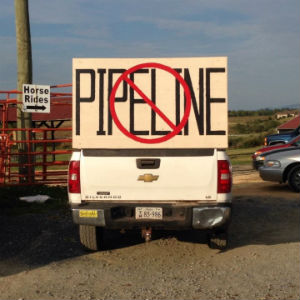
The ACP must now provide a new route or system alternatives before it can proceed.
“We’re thrilled the Forest Service followed through on its duty to protect the forests. Dominion’s arrogance in trying to force its project into an entirely inappropriate area is shocking,” said Ben Luckett, Staff Attorney with Appalachian Mountain Advocates.
As planned, the pipeline would run over 550 miles through West Virginia, Virginia, and North Carolina. It would be larger in diameter than the Keystone XL. Approximately 40-50 miles of the ACP would cut through the Washington and Monongahela National Forests.
“This project has been fast-tracked from the beginning with no regard for the treasure trove of natural resources in its path, as today’s decision by the Forest Service clearly shows, nor the extent of the impact on communities and property owners,” said Hannah Wiegard, Virginia Campaign Coordinator with Appalachian Voices.
The pipeline would cut large and permanent clearcut throughout the entire length of the pipeline, causing dramatic forest fragmentation through some of the most high-quality forest habitat in our region.
“Today’s letter is welcome news for the 44 organizations in West Virginia and Virginia who have stood together to oppose this pipeline. Our organization has said from the beginning that building a pipeline through the Allegheny-Blue Ridge region presents serious, long-term devastation to this special area of the country,” says Lew Freeman, Chair of the Allegheny-Blue Ridge Alliance. “It is commendable that the Forest Service is taking seriously its permitting role.”
“Dominion stubbornly persisted on a route that was identified as severely destructive from the start,” said Greg Buppert, Senior Attorney at Southern Environmental Law Center. “It is time for them to step back and truly reconsider the need for this pipeline at all.”
“This is very good news for the best of the remaining wild land in the central Appalachians. The Forest Service deserves real credit for meeting its stewardship responsibilities. There is reason to hope that our system may work yet,” said Rick Webb, Coordinator of Dominion Pipeline Monitoring Coalition.
“These public lands are worth protecting from pipeline development. In addition to habitat for rare species, these public lands provide important water supply to citizens throughout our region, as well as hunting, fishing, recreation and tourism opportunities critical to local communities,” said Nancy Sorrells, co-chair of Augusta County Alliance.
This denial also sets the tone for the Forest Service’s forthcoming response to the Mountain Valley Pipeline (MVP), a similarly sized pipeline routed through West Virginia and Virginia. The MVP is proposed to cut across the Jefferson National Forest, land managed by the same branch of the Forest Service that issued today’s route denial.
“The MVP threatens many of the same devastating impacts on prime forest habitat,” Luckett said.
The Forest Service is expected to comment on the MVP proposal in the coming months.
Several conservation groups oppose these proposed pipelines not only because of the direct forest impacts, but also for the role they would play in delaying renewable energy development.
Kate Asquith, Program Director for Appalachian Mountain Advocates, explained, “Billions of dollars of new natural gas infrastructure is proposed for our region. Dominion’s ill-conceived plan to sink that massive investment in gas would lock us into continued reliance on dirty, climate-altering fossil fuels for decades. Every dollar invested in this outdated and destructive infrastructure could be invested in clean, renewable energy instead.”
Kirk Bowers, Virginia Chapter of the Sierra Club, applauded the action of the US Forest Service.
“We support their efforts to keep our national forests and our mountains from being devastated by large fracked gas pipelines,” Bowers said. “Our national forests were reserved for the enjoyment of all citizens of the states and they provide recreational and economic base for our communities. These pipelines fragment our forests, jeopardize the protection of endangered species, and cross some of the most highly sensitive areas on the East Coast.”
Anne Havemann, General Counsel, Chesapeake Climate Action Network, stated: “We applaud the Forest Service for denying this permit and recognizing the threat this massive pipeline poses to the unique wildlife the agency is entrusted to protect. As more details emerge about the devastating impacts the pipeline will have on Virginians’ health and natural heritage, and on the world’s climate, the pressure will only grow for other agencies to follow the Forest Service’s lead and put the public interest ahead of Dominion’s profits.”










